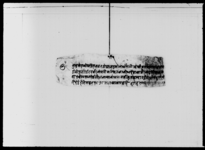A purjī from Garuḍadhvaja Pā̃ḍe ordering the provision of wheat to one Bhaktanainā (?) (VS 1878)
ID: E_2778_0004
Edited and
translated by Surabhi Pudasaini
in collaboration with
Pabitra Bajracharya
Created: 2022-07-18;
Last modified: 2022-12-31
For the metadata of the document, click here
The accompanying edition, translation/synopsis and/or commentary are available under the terms of the Creative Commons Attribution-ShareAlike 4.0 International License
Abstract
This purjī from the kaparadāra Garuḍadhvaja Pā̃ḍe orders the aḍais Rājabala Ḍoṭyāla and Ramānātha Pādhyā to provide wheat to Bhaktanainā, the niece of Manikanikā and daughter of Vākāvīra.Diplomatic edition
[1]
1⟪4⟫1⟪४⟫1श्री\1लुभुसेराकोअडैराजवलडोट्यालरमानाथपाध्याकेश्रीकपर्दारगरुडध्वजपा2डेकोपुर्जिऊप्रांतदर्वारकोपटिमनिकनिकाकोभदैवाकावीरकोछोरि[?]१के७८सालदेषीसिधालाग्याकोप्रमानगीसुनाद्वार्यागहुंपाथीपंन्द्र१५भ
4रिदेऊईतिसम्वत१८७८सालआषाढवदि४रोजशुभ्म्¯¯¯ ¯¯¯ ¯¯¯ ¯¯¯ ¯¯¯ ¯¯¯ ¯¯¯ ¯¯¯
Translation
[1r]
4
4
To the aḍais of LubhuserāRājabala Ḍoṭyāla [and] Ramānātha Pādhyā
A purjī from Śrī kaparadāraGaruḍadhvaja Pāḍe
Uprānta: Starting from the year 78, foodgrains [are] assigned to 1 [Bhakta]nainā (?), the niece (brother’s daughter) of Manikanikā [and] the daughter of Vākāvīra, [both of whom serve] the darabāra, [on the basis of] the authorization letter (pramāṅgī) [brought by] Sunā Dvāryā. Disburse (bhari deu) 15 pāthīs of wheat.
[…day], the 4th of the dark fortnight of Āṣāḍha, in the [Vikrama] era year 1878 (1821 CE). May it be auspicious.
Commentary
This is a note from the kaparadāra Garuḍadhvaja Pā̃ḍe ordering two aḍais to provide wheat to one Bhaktanainā, niece of Manikanikā and daughter of Vākāvīra, both of whom were serving the palace. This is one of ten documents (E_2778_0001 to E_2778_0010) recording the distribution of wheat to various people working within the Hanumānḍhokā palace complex. All the orders date to VS 1878 and relate to the wheat crop of Lubhu serā land in that year.
This document differs from the others in that it is the only one with four parties involved. All other documents concern the kapardāra giving the order, the two aḍaīs receiving the order, and the individual receiving the wheat. The last of these is frequently identified as a blood relation of a servant in the royal palace. In this document, Sunā Dvāryā (see also E_2778_0001) is cited as bringing the order (pramāṅgī) that Bhaktanainā was to receive 15 pāthīs of wheat, the set amount for one meal daily.
The language might suggest that Bhaktanainā was slated to receive grains (sidhā) for the first time in VS 1878 and that the order that she was to be added to the sidhā lists came via Sunā Dvāryā. Possibly the dvāre had the authority to decide when certain servants under her received foodgrains. Alternatively, perhaps she was simply carrying out an order that came from someone else. Gate attendants might often be tasked with delivering messages or documents.
Savāla 3 of RRC_0024_0776, laying out Bhoṭu Pā̃ḍe’s duties as kaparadāra in VS 1859, confirms that the kaparadāra was responsible for ascertaining the amount of foodgrains that palace servants received. Garuḍadhvaja Pā̃ḍe appears to be fulfilling that duty here. The ten directives were issued over the course of three months from Jeṭh to Bhadau. Ascertaining the amount of foodgrains that individual palace servants received was, therefore, not a task concluded in parallel. Rather, the amounts were reviewed and confirmed serially.
Garuḍadhvaja was kaparadāra from the early VS 1870s till the early 1890s. He was a son of the former kaparadāra Bhoṭu Pā̃ḍe (see Pā̃de Chetrī 1977: 246). Though the authority to ascertain amounts rested with the kaparadāra, the orders were carried out by two aḍais, Rājabala Ḍoṭyāla and Ramānātha Pādhyā. Aḍais were employed at the Koṭa Bhaṇḍāra, which managed the stores of foodstuffs within the royal palace complex. Each serā was also put under the management of one or a pair of aḍais.1 Outside the current ten documents, Rājabala Ḍoṭyāla appears again in relation to Lubhu serā [land] in VS 1880 in E_2764_0046.

